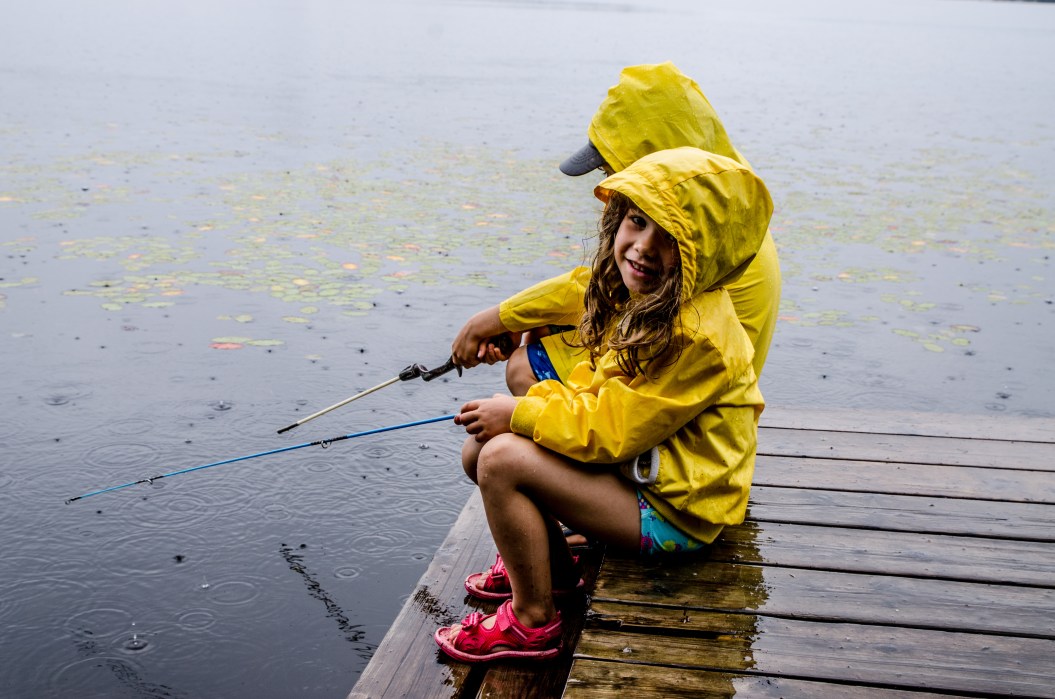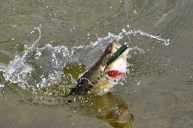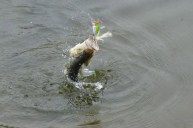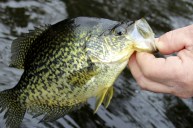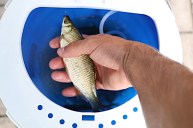While it is true that a sunny day may make for a more pleasurable fishing experience, a rainy day can actually make for a more successful one. A good rainstorm can actually energize fish, and if you understand the reasons why, you can capitalize on their increased energy.
Here's why you fishing in the rain can actually mean bigger and better catches, how to turn your next rainy-day fishing trip into your most productive day yet, and how to stay safe on the water in a storm.
Why Fishing in the Rain Can Be More Successful
1. Fish Are More Active
Fish don't care if it's raining out; in fact, they may prefer it. A good rainstorm can actually stir fish into a feeding frenzy, making them far more likely to bite whatever you're offering on the end of your line. Run-off from a heavy rain can carry all sorts of tasty fish treats like worms and insects into a river, and can also stir up the small aquatic creatures already in a body of water.
In lakes, rainfall can bring fresh oxygen in and change the temperature of the water. These sudden changes energize baitfish, which in turn brings a burst of feeding energy to larger fish.
Fish are also more likely to be surface-oriented during a rainstorm, likely because they feel safer from predators such as hawks and mergansers, which typically prefer waiting a rainstorm out under shelter.
Falling barometric pressure, a sign of worsening weather, can also stir fish into movement. While researchers haven't quite figured out why fish are more active during falling pressure, it's possible that minor changes in barometric pressure affect a fish's swim bladder, an organ that regulates a fish's buoyancy. Dropping pressure expands the fish's swim bladder, which is thought to cause the fish discomfort.
To alleviate it, fish become more active and seek out deeper waters (and therefore higher pressure) to shrink their swim bladder. A low-pressure system is not necessarily a good time to fish, as the fish will have already taken off to deeper waters. But in worsening weather, when the pressure is just starting to fall, fish will be more active as their swim bladders begin expanding.
2. Bigger Fish Are Flushed Out
Bigger fish often hand out at greater depths, where they are difficult to locate. However, heavy rain can churn up sediment near the bottom of a body of water, making it unpleasant for fish. This churning-up forces fish to the surface, particularly bottom feeders like catfish or carp.
Rain can also make a body of water far colder, as it forces warmer water to sink deeper in the water column. Many larger fish, like bass, head to deeper waters to get away from the oppressive summer heat. When that warm water sinks, it can drive them to swim up to the now cooler water near the surface.
3. There's Less Competition on the Water
Not every angler is willing to brave a rainy day, even if the fish are biting. But, another angler's loss is your gain. You know that super-busy lake where it feels like you're constantly bumping elbows with other fishermen and women? Grab a rain jacket and head out in a heavy downpour.
Odds are, you'll have much of the lake to yourself. Sometimes, the tougher the conditions, the better.
On heavily pressured lakes, the fish know when they're being targeted, and many know that pressure falls off at the same time the skies open with precipitation.
Top Tips for Fishing in the Rain
1. Focus On Creeks and Inlets
When the rain starts falling, you need to fish locations where water is flowing into a lake since that is where fish activity will be the most concentrated. For your rainy day out, find a creek, river, a small inlet, or even a culvert that's emptying into a lake. While rain is going to help circulate fresh oxygen everywhere in a body of water, it's going to do so even faster here because of the runoff flowing into the lake. This extra oxygen will draw in baitfish, and bass and other predatory gamefish will follow.
Also, look for a confluence where clear water meets murkier water. In a heavy rain storm, sediment in the water is going to be disturbed at a higher rate, and fish will tend to move away from muddy water if they can. In some feeder inlets and creeks, you may be able to see a clearly defined line between clear and murkier water. This makes it one of the best fishing spots, as fish will opportunistically feed as they move into clearer, shallower waters.
2. Cover a Lot of Water
When we say that rain spurs a burst of feeding energy in the fish, we mean it. Fish that have previously been holding tight to cover or suspended at depth are much more likely to start roaming around in a rainstorm, and you may find fish prowling or cruising through areas you wouldn't normally find them.
Keep a close eye on water levels. Be familiar with the waters you're fishing. If you've had a series of storms and water levels have risen 2 feet or more, there is the possibility of additional cover in things like seawalls, yard furniture, and wood structure that is not normally submerged. Work these areas quickly to determine if they're holding fish before moving on. Shorelines can also be productive in a windy storm, as bait may have been pushed up into the shore, drawing larger fish with it.
3. Adjust Your Rig
As we've outlined, a good rainstorm can change the behavior of the fish you're targeting. Make sure to adjust your fishing setup to account for this.
Since bigger fish are more likely to be higher in the water column during a rainstorm, your usual deepwater jigs probably won't cut it. However, because they are in a feeding frenzy, fish are more likely to go after an artificial lure they'd normally be wary of.
Try using a lure that's larger than one you'd normally lose. Something big and flashy that looks like a wounded baitfish is perfect, and helps fish locate the bait in murkier water. The fish are going to be keying on prey items during a rain and many larger fish will go for the easier meal of a prey item that already appears to be crippled. Fish will also likely be more aggressive, so play around with faster speeds on your lures.
A rainstorm could also be a great time to break out a trusty topwater lure. While most people reserve them for calm, spring and summer mornings when there isn't a ripple anywhere on the surface of the water, topwaters can be dynamite in the rain, too. Something like a stickbait or buzzbait can also help you cover a lot of water in a storm.
Beware: Fishing in Lightening
Rain brings the possibility of thunderstorms and lightning, which are real hazards when fishing. Many anglers have been killed when their fishing rod became a literal lightning rod. Keep a close eye on weather forecasts, and if you hear thunder, know that it will be followed by lightning.
If a thunderstorm rolls up, get to shelter as quickly as possible.
Without thunder and lightening though, a little rain never hurt anyone—although it can make for an uncomfortable experience if you're not properly equipped. Make sure you have a solid pair of rain pants and a hardshell rain jacket if you plan on fishing in rainy weather.
Simms, Columbia, Frog Toggs, and Marmot are all good brands to consider if you're looking to buy some serious rain gear. Look at factors like insulation and breathability as factors for selecting a coat. Depending on how where you live and what the average temperatures are, you may want more or less of either.
